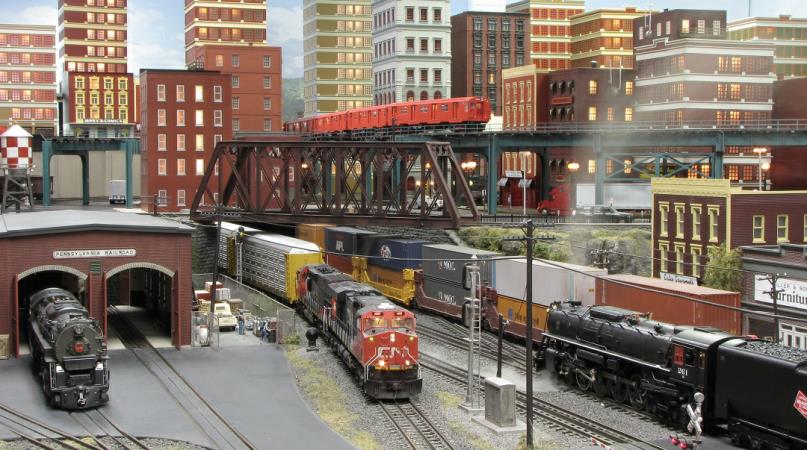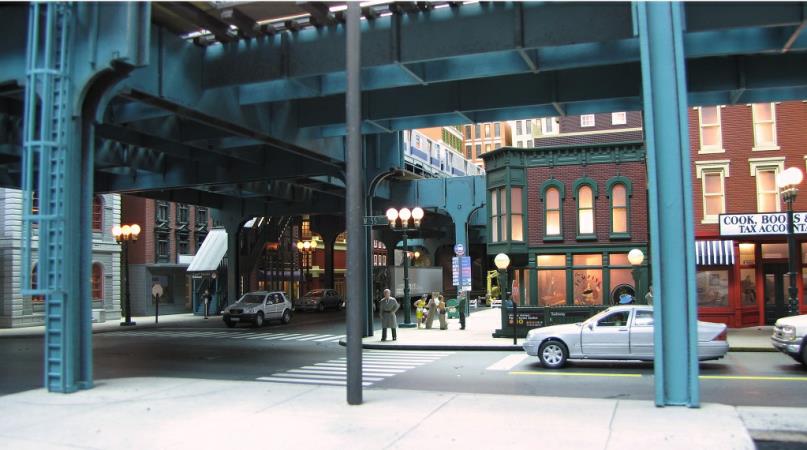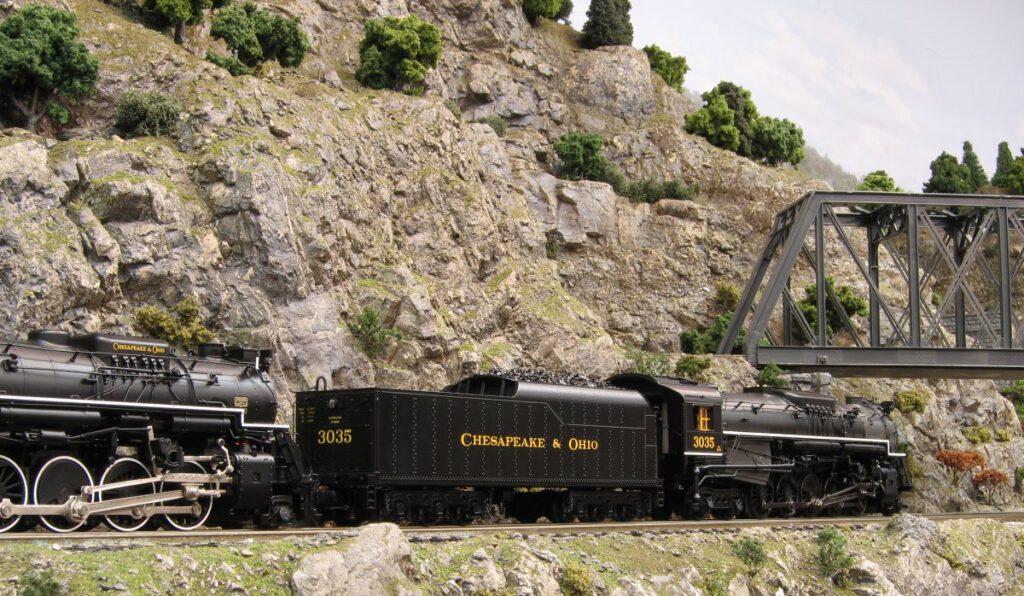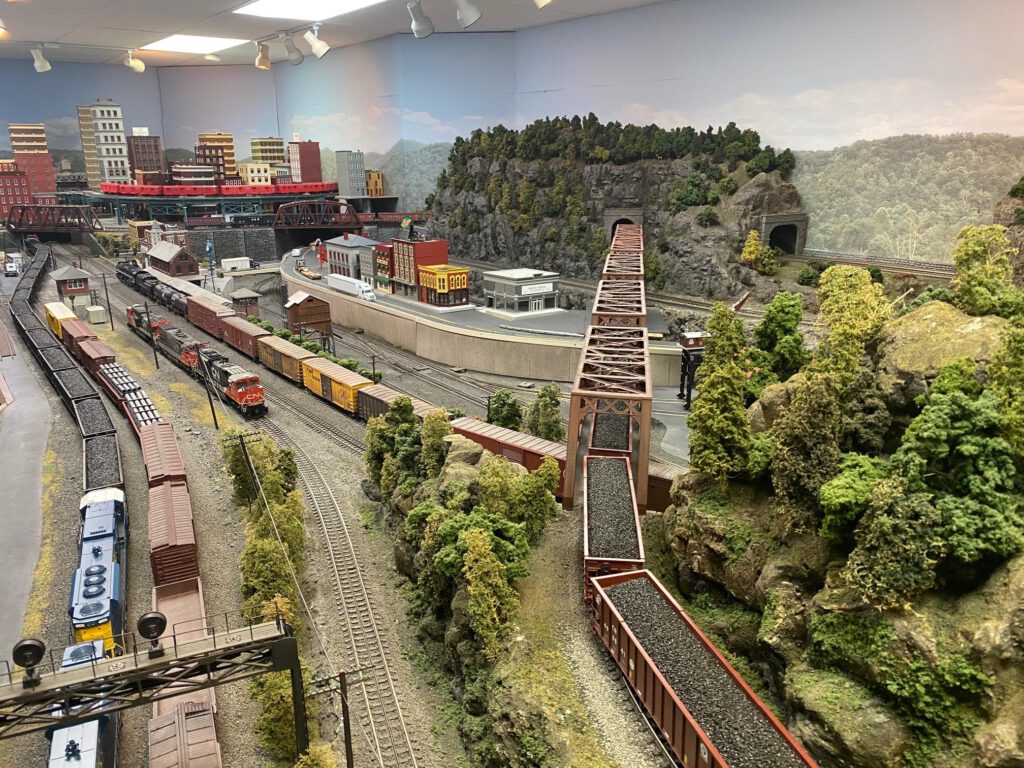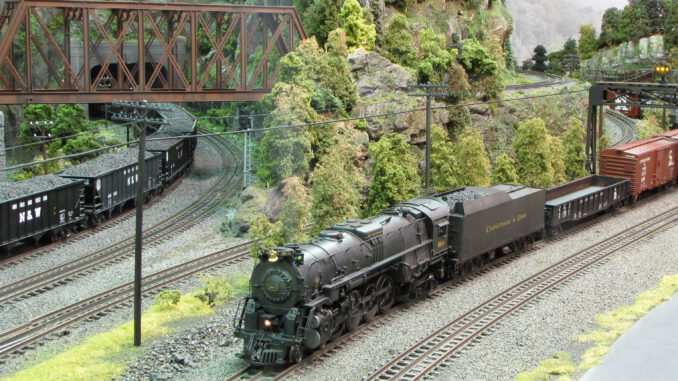
MODEL BEHAVIOR
by Chris Wadsworth
There is something magical about a model train. Whether on display at a museum or a shopping mall, young and old alike are drawn to them and the miniature world they inhabit. For Rich Battista, this magic has been a part of his life since he was a little boy playing with trains in his attic.
Today, the 57-year-old engineer lives in Ashburn’s Timberbrooke neighborhood — and he’s still playing with trains but on a much bigger scale than during his childhood. The married father of three has turned a large portion of his basement into a giant track — complete with a tiny town and a countryside filled with rivers, hills, mountains and bridges. It’s a sight to behold.
Ashburn Magazine visited Battista’s basement to talk about how his hobby came to life — and how he has become something of a big deal in the world of model trains. Here are portions of our conversation.
Ashburn Magazine: When and where did you first get interested in model trains?
Rich Battista: “My grandfather and his Christmas tree — he had a train going under the Christmas tree every year and I just loved to watch it. That got me started. My dad’s sister also put a big display under the tree, and she put up buildings and stuff.”
What fascinated you about model trains?
“ I’m an engineer by trade and I have this creative streak in me, and my dad built me a small layout up in the attic. He used to make little wooden (railroad) ties for me and telephone poles. I even wired up a little circuit so when weight pushed on it, it would stop one of the trains at a crossing so they wouldn’t collide.”
Lots of kids have passions like this, but then they grow up and they disappear.
“I went to college and I forgot about trains for a long time. Eventually I got married, and I actually had some money and I started collecting (train cars), but I didn’t have the space I needed. But I always had this desire to build something big. When we moved back here (to the east coast) where we are from, we got the big house and had a big basement and I thought, ‘This is my chance.’”
What was your vision and how did it grow?
“I spent a year building it. I wanted it to be designed on paper ahead of time, so I wasn’t shoehorned in a corner and stuck. The main thing for me was a big straightaway with a very large curve because a lot of classic train layouts will have very tight turns. It’s not realistic. So I ended up hiding the tighter curves in the mountains, so I have these scenes that look much more realistic.”
How important is that realism to you?
“To me, it’s more fun to create scenes that are realistic. If I took a picture, you wouldn’t know in some cases that it’s a model. I just strive to make it as close to a real, tiny world as possible.”
What did you kids think of this growing up?
“My kids loved it when they were little. My younger one would run down the steps going ‘choo chooo.’ But as they got older, they became less interested. And then they got cell phones and it was over (laughs).”
You’ve made up this little town and this landscape, but even if it’s pretend, you’ve modeled it on the area you grew up.
“This is actual dirt from behind my parents’ house in Pennsylvania, in the coal region. I ended up using real ground materials to get the right colors. I wanted it to look like Pennsylvania. My layout is called the ‘Black Diamond Railway.’ Black diamond means coal.”
You fabricated these hills and mountains yourself — how did you learn to do that?
“When I was a kid of 10 or 12, I used a screen over a wooden structure, with plaster smeared over it and it looked like a cupcake. I wanted something much more realistic. Twenty years ago, the internet wasn’t prevalent and there wasn’t as much stuff available and I would find these books and videos that were not very instructive. At that point, I realized I needed to figure it out myself. And that’s what led to making my own videos.”
Tell us about your secret process.
My mountains were kind of a unique technique that no one else had done. Basically it’s a wooden frame with this brown construction paper that you get at Home Depot. I would staple that onto the wood and get the initial shape and then I would apply paper towels dipped in plaster and let it harden. After that, I would fill the gaps with crushed plaster. A lot of people since have mimicked my technique.”
You’ve become kind of a big deal in the model train world — with magazine features and your videos. How did this go from a hobby to a business?
“I would go to a train show every year, in York, Pennsylvania. I started going to look for trains and to buy stuff. And I had some pictures on my phone and I was showing people what I was building, and that got the attention of some of the model train companies and some of the magazines. I was featured in one, and from that point, I was on the map and people knew about me. And doing the videos made me even more well known. I released the first video in about 2007 and since then, I’ve sold videos around the world.”
After having this train layout for 14 years, you are going to take it down this winter. How can you do that?
“I’m excited. I love to build layouts. I have a 3-D simulator where I’m creating the new plan. I did get the CEO – my wife – to approve me taking a wall down so I can build a slightly bigger layout. Now I will be able to enjoy the layout from both sides. I’m excited to have an even bigger layout just for the realism — it gives me a lot more surface area.
For you, it’s about the process of creating?
“It may sound funny, but I don’t come down here and run my trains. I only run them when someone comes and visits or when I buy a new train, I’ll put it on the track and run it. But honestly, I get bored. I’ve seen it so many times. It’s the creation I love — this is my canvas.”


